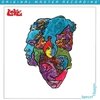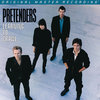SORRY - SOLD OUT
AAA 100% Analogue This LP was Remastered using Pure Analogue Components Only from the Master Tapes through to the Cutting Head
Speakers Corner / Atlantic -SD 8145 - 180 Gram Virgin Vinyl
AAA 100% Analogue - Mastered by Kevin Gray at Cohearant Audio
Limited Edition - Pressed at Pallas Germany
Speakers Corner 25 Years Pure Analogue This LP is an Entirely Analogue Production
hi-fi+ August 2014 Review by Dennis Davis -Inside one of the one of the best looking record covers of all time is one of Wilson Pickett’s masterpieces. The album contains a number of megahits such as ‘Funky Broadway’ and ‘I Found A Love’, but each song is a polished gem, and most received significant airplay. To put this LP in context, it was released the year after Pet Sounds and the same year as Sgt. Peppers Lonely Hearts Club Band. As different as this music sounds from those two classics, it stands comparison to each of them. Sound 9/10 Music 10/10
Pickett was writing and signing original music that represented its time and place, even though it never enjoyed the market success of the Beach Boys or Beatles. The songs were recorded at Fame Recording Studios in Muscle Shoals, Alabama by Fame founder Rick Hall and independent engineer Tom Dowd, with backing from one of the greatest groups of session players ever assembled.
The sound is outstanding and appropriate to the type of aggressive sound Pickett produced. Although this is the stereo version, which has a bit too much left right separation, that slight quibble pales in comparison to the explosive sound captured here by Dowd and mastered to perfection by Kevin Gray. Highest recommendation. DD
Wilson Pickett’s best years were those when he recorded for Atlantic Records, and he remained convinced of this even after changing to other labels in his later career. Atlantic boss Jerry Wexler took the promising young Gospel singer under his wing and launched him on his rapidly developing career as an unruly soul man. Pickett’s aggressiveness, which in his mature years occasionally resulted in him having backstage fights with musicians and managers, are expressed here in strong words and are given further bite by his antagonistic band. Although he lashed out to the full in his emotional, crackling vocal attacks, he never lost control and even his strongest outbursts remained highly musical.
His unique, breathless sound and his ferocious efforts to express himself succinctly do not make for easy listening on this superb hit record and for white people, who according to Pickett would never understand soul music anyway, could well present a real challenge. Is this such fascinating music that you become dumbstruck? Very possibly, as critic Joachim von Mengershausen writes: "His voice is hard, aggressive and strained; it hardly binds the tones together, chops up the phrases, blurts out the essentials – Pickett has eliminated all the Uncle-Tom warmth in soul and has virtually rocked it away."
The Sound of Wilson Pickett was one of the three albums Atlantic issued by the Wicked One in 1967. Produced by Jerry Wexler (who got co-writes on a couple of tracks), it featured great session players like Chips Moman and Spooner Oldham, to name just two. Looking at the track list, it looks like a slew of hits. But it wasn't. In fact, it was two sides packed with singles. While it contains his absolutely classic, wailing read of "Funky Broadway," it also features both parts of "I Found a Love" (renamed "I Found a True Love" for the 1968 album The Midnight Mover), the Oldham and Dan Penn suggestive classic "I Need a Lot of Loving Everyday."
Pickett's reading of the song with a killer female backing chorus smolders with nocturnal nether-hipped fire. Pickett's version of Rudy Clark's swaggering "You Can't Stand Alone" is a burning throw-down with awesome guitar and horn charts and a killer little Farfisa break in the middle. He also sings the deep Memphis blues on "Something Within Me." The set closes with one of his finest performances, his signature reading of "Love Is a Beautiful Thing." Arguably,
The Sound of Wilson Pickett may be his finest album performance of the entire decade.
Musicians:
Wilson Pickett, vocals
Spooner Oldham, piano, organ
Andrew Love, tenor saxophone
Floyd Newman, baritone saxophone
Gene Miller, trumpet
Wayne Jackson, trumpet
Jimmy R. Johnson, guitar
Chips Moman, guitar
Junior Lowe, bass
Roger Hawkins, drums
Selections:
1. Soul Dance Number Three
2. Funky Broadway
3. I Need A Lot of Loving Every Day
4. I Found A Love, Part 1
5. I Found A Love, Part 2
6. You Can't Stand Alone
7. Mojo Mamma
8. I Found the One
9. Something Within Me
10. I'm Sorry About That
11. Love Is A Beautiful Thing
Recording: 1967 at Fame Recording Studios, Muscle Shoals (Alabama, USA), by Rick Hall & Tom Dowd
Production: Jerry Wexler

20 Years pure Analogue
This Speakers Corner LP was remastered using pure analogue components only, from the master tapes through to the cutting head 20 Years pure Analogue
Are your records completely analogue?
Yes! This we guarantee!
As a matter of principle, only analogue masters are used, and the necessary cutting delay is also analogue. All our cutting engineers use only Neumann cutting consoles, and these too are analogue. The only exception is where a recording has been made – either partly or entirely – using digital technology, but we do not have such items in our catalogue at the present time
Are your records cut from the original masters?
In our re-releases it is our aim to faithfully reproduce the original intentions of the musicians and recording engineers which, however, could not be realised at the time due to technical limitations. Faithfulness to the original is our top priority, not the interpretation of the original: there is no such thing as a “Speakers Corner Sound”. Naturally, the best results are obtained when the original master is used. Therefore we always try to locate these and use them for cutting. Should this not be possible, – because the original tape is defective or has disappeared, for example – we do accept a first-generation copy. But this remains an absolute exception for us.
Who cuts the records?
In order to obtain the most faithful reproduction of the original, we have the lacquers cut on the spot, by engineers who, on the whole, have been dealing with such tapes for many years. Some are even cut by the very same engineer who cut the original lacquers of the first release. Over the years the following engineers have been and still are working for us: Tony Hawkins, Willem Makkee, Kevin Gray, Maarten de Boer, Scott Hull, and Ray Staff, to name but a few.
At the beginning of the ‘90s, in the early days of audiophile vinyl re-releases, the reissue policy was fairly straightforward. Companies such as DCC Compact Classics, Mobile Fidelity, Classic Records and others, including of course Speakers Corner, all maintained a mutual, unwritten code of ethics: we would manufacture records sourced only from analogue tapes.
Vinyl’s newfound popularity has led many other companies to jump on the bandwagon in the hope of securing a corner of the market. Very often they are not so ethical and use every imaginable source from which to master: CDs, LPs, digital files and even MP3s.
Even some who do use an analogue tape source employ a digital delay line, a misguided ’80s and ‘90s digital technology that replaces the analogue preview head originally used to “tell” the cutter head in advance what was about to happen musically, so it could adjust the groove “pitch” (the distance between the grooves) to make room for wide dynamic swings and large low frequency excursions. Over time analogue preview heads became more rare and thus expensive.
So while the low bit rate (less resolution than a 16 bit CD) digital delay line is less expensive and easier to use than an analogue “preview head”, its use, ironically, results in lacquers cut from the low bit rate digital signal instead of from the analogue source!
Speakers Corner wishes to make clear that it produces lacquers using only original master tapes and an entirely analogue cutting system. New metal stampers used to press records are produced from that lacquer. The only exceptions are when existing metal parts are superior to new ones that might be cut, which includes our release of “Elvis is Back”, which was cut by Stan Ricker or several titles from our Philips Classics series, where were cut in the 1990s using original master tapes by Willem Makkee at the Emil Berliner Studios. In those cases we used only the original “mother” to produce new stampers.
In addition, we admit to having one digital recording in our catalogue: Alan Parsons’ “Eye in the Sky”, which was recorded digitally but mixed to analogue tape that we used to cut lacquers.
In closing, we want to insure our loyal customers that, with but a few exceptions as noted, our releases are “AAA”— analogue tape, an all analogue cutting system, and newly cut lacquers.
60 Years Pallas
Audiophile Vinyl - Made in Germany For over 60 years the family business in the third generation of the special personal service and quality "Made by Pallas" is known worldwide. Our custom PVC formulation produces consistently high pressing quality with the lowest surface noise in the industry. Our PVC complies with 2015 European environmental standards and does not contain toxic materials such as Lead, Cadmium or Toluene. Our vinyl is both audiophile and eco-grade!















